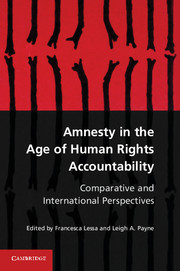Book contents
- Frontmatter
- Contents
- Contributors
- Foreword
- Acknowledgments
- Introduction
- Part I Theoretical Framework
- Part II Comparative Case Studies
- 3 Amnesties’ Challenge to the Global Accountability Norm?
- 4 From Amnesty to Accountability
- 5 Barriers to Justice
- 6 Resistance to Change
- 7 De Facto and De Jure Amnesty Laws
- 8 Creeks of Justice
- 9 Accountability through Conditional Amnesty
- 10 De Facto Amnesty?
- 11 A Limited Amnesty?
- 12 The Spanish Amnesty Law of 1977 in Comparative Perspective
- Conclusion Amnesty in the Age of Accountability
- Bibliography
- Index
- References
8 - Creeks of Justice
Debating Post-Atrocity Accountability and Amnesty in Rwanda and Uganda
Published online by Cambridge University Press: 05 June 2012
- Frontmatter
- Contents
- Contributors
- Foreword
- Acknowledgments
- Introduction
- Part I Theoretical Framework
- Part II Comparative Case Studies
- 3 Amnesties’ Challenge to the Global Accountability Norm?
- 4 From Amnesty to Accountability
- 5 Barriers to Justice
- 6 Resistance to Change
- 7 De Facto and De Jure Amnesty Laws
- 8 Creeks of Justice
- 9 Accountability through Conditional Amnesty
- 10 De Facto Amnesty?
- 11 A Limited Amnesty?
- 12 The Spanish Amnesty Law of 1977 in Comparative Perspective
- Conclusion Amnesty in the Age of Accountability
- Bibliography
- Index
- References
Summary
For the last twenty years, Rwanda and Uganda have experienced some of the most violent and destructive conflicts in the world. The overlapping nature and the scale of these conflicts – involving tens of thousands of civilian perpetrators and victims – inevitably shape the international and domestic justice processes designed to address mass crimes. Since 1986, the civil war in northern Uganda between the Ugandan government and the Lord’s Resistance Army (LRA), a rebel force infamous for its abduction and enlistment of children, has killed tens of thousands of civilians. In response, a government “protection” policy of forced displacement has driven an estimated 1.7 million people, nearly ninety percent of the total northern Ugandan population, into 200 squalid camps for internally displaced persons (IDPs). In 1994 in Rwanda, between five hundred thousand and one million Tutsi and their perceived Hutu and Twa sympathizers were systematically murdered in a genocide that lasted a little over three months. The génocidaires, many of whom knew their victims personally, killed intimately, with basic weapons such as machetes, hoes, and spiked clubs known as panga, and usually near victims’ homes.
This chapter focuses on the accountability measures adopted in response to atrocities in Rwanda and Uganda and situates them specifically in ongoing debates about the appropriateness and legality of amnesty for perpetrators of serious human rights violations. In particular, this chapter examines accountability trends in these countries in light of Kathryn Sikkink and Ellen Lutz’s theory of the justice cascade, represented by “the dramatic shift in the legitimacy of the norms of individual criminal accountability for human rights violations and an increase in actions (prosecutions) on behalf of those norms.” In her chapter in this volume, Sikkink emphasizes the importance of international and domestic norm entrepreneurs, including international human rights organizations, activists, and scholars, in fostering the “international diffusion” of norms of individual criminal accountability that culminated in the adoption of the Rome Statute in 1998 and the commencement of the ICC’s work in 2002.
- Type
- Chapter
- Information
- Amnesty in the Age of Human Rights AccountabilityComparative and International Perspectives, pp. 210 - 237Publisher: Cambridge University PressPrint publication year: 2012
References
- 2
- Cited by



